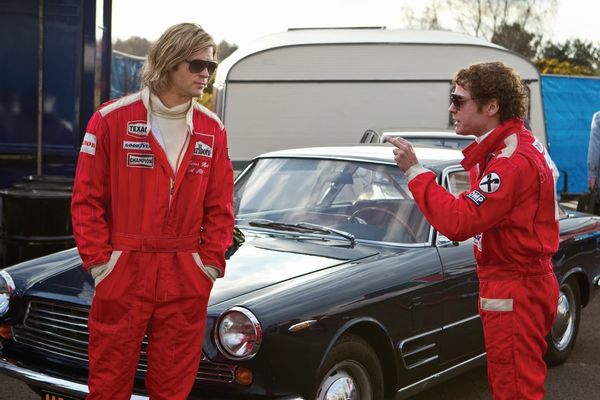Eye For Film >> Movies >> Rush (2013) Film Review
Rush
Reviewed by: Jeff Robson

Apart from boxing, there’s possibly no sport quite so cinematic as motor racing. Essentially an extended car chase, it offers speed, drama and the vicarious frisson of mortal danger, all within an enclosed, relatively easy to film space.
It’s in a direct line stretching back to the chariot races that thrilled the bloodthirsty Roman crowds and its gladiatorial nature has thrown up some epic rivalries over the years. So it’s a surprise that (unlike boxing) it’s never inspired a truly great movie.

John Frankenheimer’s Grand Prix was a fun but conventional mid-Sixties all-star glossy, while Winning and Le Mans were little more than vanity projects enabling Paul Newman and Steve McQueen to have a go round the track. Asif Kapadia’s excellent 2010 documentary Senna came closest, capturing the atmosphere of the Formula One circuit and the complex psyches of the drivers as well as the bureaucratic infrastructure and corporate compromises they face in pursuing a sport whose gentleman-amateur origins have become subsumed in a billion-dollar industry.
So I had high hopes of Howard’s much-hyped biopic of one of the great Formula One head to heads. James Hunt and Niki Lauda bestrode their arena in the mid-Seventies and were the classic contrasting sports archetypes: artist and artisan, Cavalier versus Roundhead. Hunt was the charming aristocratic Englishman from central casting, basing everything on nerve and instinct. Lauda the austere Austrian details man, who knew more about his cars than the pit team and never took what he considered unacceptable risks.
Competitors since their early days on the Formula Three circuit, it’s a matter of some debate whether they personally disliked each other - articles in the sports sections prompted by the film suggest a strong, if guarded, friendship between two very different men who just didn’t like being beaten by anybody – but Howard and writer Morgan (The Queen, Frost/Nixon) choose to ramp up the personal duel aspect, with Hunt constantly needling his ‘Kraut’ opponent, especially when he rises through the Formula One ranks considerably quicker.
It’s a cracking story either way and there’s no danger of it being told ineptly with a team like Howard and Morgan at the helm. The screenplay zips along nicely with only the odd clunker (“the name’s Hunt. James Hunt” hammers home a link I think we’d all picked up, thank you) and Howard has proved himself one of modern Hollywood’s consummate narrative directors, particularly in bringing true stories to the screen (Apollo 13, A Beautiful Mind) – without perhaps ever demonstrating enough flair and subtlety to transcend superior journeyman status.
He certainly captures the visceral adrenalin rush of the races but is equally adept at depicting the drivers’ personal lives, as they find their equally obsessive personalities ill-suited to developing relationships. The period atmosphere is recreated in all its ‘glory’ (right down to a gratuitous topless shot) and Hans (Gladiator) Zimmer provides a pulsing, muscular score complemented by a soundtrack album’s worth of 70s classics.
It’s all good, enjoyable Friday night at the multiplex stuff – but, ironically, a bit too smooth a ride. The film takes a more promising turn, however, when the rivalry has fateful consequences. Lagging behind reigning champion Lauda in the 1976 championship, Hunt is one of the voices speaking against the Austrian when he asks for the German Grand Prix to be called off, citing the appalling weather and the Nurburgring track’s notorious safety record.
The race goes ahead and Lauda crashes, suffering horrific burns. His struggle to survive, then recover, is depicted with harrowing and genuinely moving intensity. Defying the doctors’ predictions (and advice), Lauda is back behind the wheel in a matter of weeks. When the last race of the season, the Japanese Grand Prix (held in conditions where you’d think twice about nipping down the road to Tesco’s) comes round both men could still be champions – and I’d defy anyone not to be on the edge of their seat as the final act is played out.
After this, the film tails off somewhat and the screenplay resumes its somewhat sudsy and over-egged nature. Perhaps with a director like Scorsese at the helm (and Morgan reaching his earlier heights) the film would have explored its protagonists’ complex characters in closer detail, and looked more at the wider context of Formula One in the Seventies when (as Lauda casually remarks in voiceover during the opening scene) every championship claimed at least two drivers’ lives.
But as a recreation of a fast and furious era, when practice accidents could result in a flying tyre coming through a spectator’s windscreen half a mile away and pre-race warm-up routines included a glass of champagne it’s undeniably effective and the names you remember from Sunday afternoons in front of the telly – Jody Scheckter, Carlos Reutemann, Clay Regazzoni - come across as a more interesting group than today’s intense, media-savvy youngsters.
Hemsworth certainly has fun recreating the cartoonish playboy side of Hunt’s character but is less sure at bringing out the pathos of the eternal boy racer, unable to cope when the offers to join a team dry up or his glamour model wife Suzy (Wilde) leaves him for Richard Burton – as you do. Bruhl, a solid presence in everything from Goodbye Lenin to Inglourious Basterds, is on top form as Lauda, though, achieving an astounding physical likeness and nailing the character’s undeniably prickly and unfathomable nature. Among a top-notch supporting cast Lara is particularly good in an underwritten role as Marlene, the socialite who nurses him through his trauma and shows a selfless devotion to a man who tells her frankly that, for him “happiness is the enemy”, preventing him from constantly striving.
Undoubtedly a classy mainstream product, and worth a look even if (like me) you’re no petrolhead, but ultimately Rush is more an assembly line product than a custom-made classic.
Reviewed on: 10 Sep 2013

















